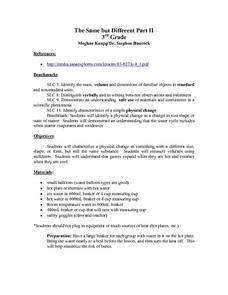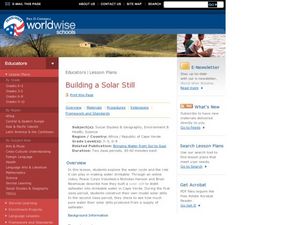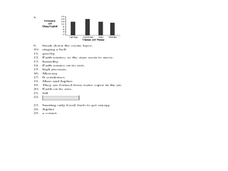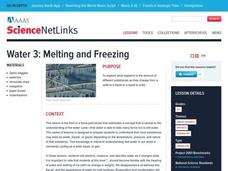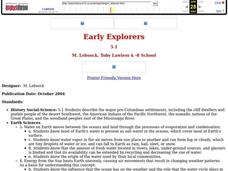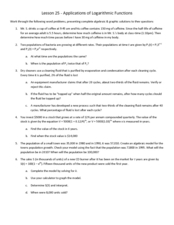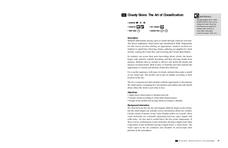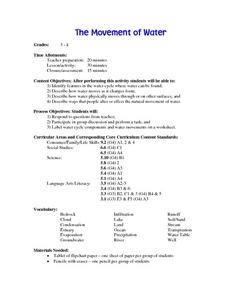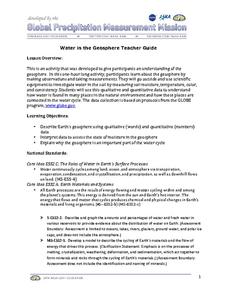Virginia Department of Education
The Hydrologic Cycle
There is the same amount of water on earth now as there was when it was formed. The water from your faucet could contain molecules that dinosaurs drank! Young scientists build their own hydrologic cycle model and observe it for five...
Curated OER
Weather Challenge
For this identifying the weather terms activity, students read phrases about the weather and choose the term being described. Students choose 11 multiple choice answers.
Curated OER
Physical Changes and States of Matter - One
Third graders study the three states of matter and identify the physical changes that take place between them. There is an initial teacher-led demonstration followed by a meaningful whole-class inquiry. These two activities should lead...
Curated OER
The Same, But Different Part II
Learners characterize a physical change as something that changes to a different size, but retains its basic substance. They measure volumes using milliliters, and perform an experiment that proves that gases expand when hot and contract...
Curated OER
Building A Solar Still
Students investigate the water cycle by viewing an online video. In this drinking water lesson, students create solar stills at their campus in order to purify water that is tainted. Students view a video on their computers about...
Curated OER
Water and Ice
Students observe and discuss what happens when water turns to ice and when ice turns into water. In this freezing and melting lesson plan, students observe ice and water and complete hands on activities that change their properties.
Curated OER
Water and Ice
Students explore water and how it changes forms. In this investigative lesson students participate in an activity that shows them how water changes form and what it looks and feels like.
Curated OER
Fourth Grade Science Concepts Practice
In this grade 4 science worksheet, 4th graders complete 25 multiple choice questions covering a variety of 4th grade science concepts. An answer key is included.
Curated OER
Water and Ice
Students perform experiments in pairs to visualize the changes in water during freezing and melting. In this properties of water lesson, students use their senses and inquiry tools to understand the changes in state of water. Suggested...
Curated OER
Melting and Freezing
Students explore how various substances change from a solid to a liquid or from a liquid to a solid and how temperature, pressure and nature play an important role in this process. In this melting and freezing lesson, students review the...
Curated OER
Selling The Molecular Kinetic Theory
Students investigate molecule movement according to the kinetic molecular theory. In this kinetic molecular theory lesson plan, students observe demonstrations showing that molecules speed up with increasing temperature and slow down...
Curated OER
Early Explorers
Fifth graders study early explorers. In this World history lesson, 5th graders draw an outline of a map labeling each part, build geographical features out of dough, and paint each of the land and water features.
Curated OER
Lesson 25 - Applications of Logarithmic Functions
in this applications of logarithmic functions worksheet, students solve 11 short answer problems. Students use logarithms to find half lives, compound interest, and population growth given a word problem.
Bekshire Museum
Cloudy Skies: The Art of Classification
Such a great resource and perfect for learners in Kindergarten through third grade. The class will discuss cloud types and formation, and then they'll get outside and draw as they observe the clouds they see. They'll need to take note of...
Curated OER
The Movement of Water
Here is an excellent lesson plan on the water cycle and the states in which water exists. Learners identify the features of the water cycle, describe how water changes form, and look at ways that people affect the natural movement of...
Curated OER
Chalkboard Challenge
Here's a terrific Jeopardy-style game that's designed for 3rd and 4th grade students of science. The topics include living things, animals, plants, matter, and "hodge-podge." The questions are all age appropriate, and there is an...
Curated OER
Water in the Geosphere
Through a PowerPoint presentation and the embedded animation and video, earth science enthusiasts find out about the moisture in the soil beneath our feet. In the animation, follow a water molecule on its path through the water cycle. As...
Curated OER
It's Raining, It's Pouring: The Water Cycle
Middle schoolers investigate the relationship of the steps in the water cycle, and create a simulation of the water cycle in a jar.
Curated OER
Winter Wonderland - Winter Olympics and the Water Cycle
After a concise introduction to the water cycle, junior meteorologists access NOAA's average snowfall data. They choose a city to examine in terms of precipitation. Then they look at historical snowfall data and use it to predict snow...
Curated OER
Antonyms 4
Practice antonyms with your young readers! Ten questions provide one word, as well as five words underneath it. Learners choose the word from the list whose meaning is the most unlike the top word's meaning. You could use this resource...
Forest Foundation
Forest Watersheds
Where does the water we use come from? To understand the concept of a watershed, class members study the water cycle and then engage in an activity that simulates a watershed.
Curated OER
Cycling of Matter and Energy
These twenty various types of questions related to the cycling of matter and energy require students to match each definition in column 1 with the correct vocabulary term from column 2. Then, students explain what is being demonstrated...
Curated OER
The Earth's Atmosphere and Temperature
Students describe and compare the layers of the atmosphere. They explain how to measure the temperature of the atmosphere and discover what causes the atmosphere to heat up in some places more than in others.
Curated OER
The Water Cycle
Your class sets up a mini water cycle model to examine the process. Then they watch an animation, following a water molecule through the cycle. A well-developed lab sheet guides learners through the instructional activity and a...





